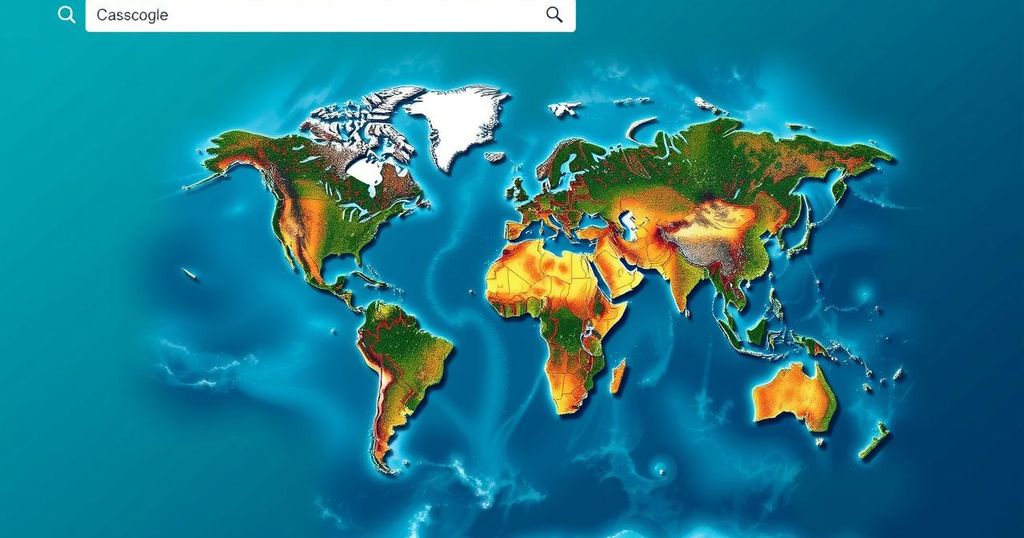Climate change
Technology
ARGENTINA, CLIMATE, CLIMATE CHANGE, CLIMATE COGNITION LAB, ESTONIA, EUROPE, GOOGLE, GREENHOUSE GAS EMISSIONS, MAD, MADALINA VLASCEANU, MICHAEL BERKEBILE - WEINBERG, NEW YORK UNIVERSITY, RESEARCH, SOUTH AMERICA, STANFORD DOERR SCHOOL OF SUSTAINABILITY, SUSTAINABILITY, VLASCEANU
Fatima Khan
0 Comments
The Impact of Image Search Algorithms on Climate Change Perceptions
A study in *Nature Climate Change* reveals that the images returned by search engines for ‘climate change’ vary by country, reflecting local attitudes toward the issue. Countries with heightened concerns show images of extreme weather impacts, while those with less concern exhibit more abstract or distant representations. Researchers suggest that enhancing the relevance of image search results can improve public understanding and mobilize climate action effectively.
A recent study published in Nature Climate Change highlights how image search outcomes for “climate change” differ noticeably across countries and reflect the prevailing attitudes toward the issue. In Argentina, images of burning homes dominate search results, likely due to heightened climate concerns amid recent wildfires. Conversely, Estonia’s searches yield images of icebergs and scientific charts, which may convey climate change as a distant issue. Research led by Madalina Vlasceanu from Stanford emphasizes that improved image search outputs are crucial for enhancing global awareness and informing effective climate action. The study involved analyzing Google Image Search results from 49 different nations in response to the term “climate change,” and it evaluated participants’ emotional responses and actions influenced by the displayed images. Findings revealed that countries with higher existing concern about climate change rated the images as more emotionally impactful, suggesting that search algorithms may propagate existing sentiments rather than creating new ones. Further experiments indicated that individuals exposed to images from high-concern nations felt more threatened by climate change and expressed stronger support for climate policies. The researchers assert the necessity of algorithms that accurately represent climate-related impacts to drive societal change. They advocate for a collaborative effort among various disciplines, including behavioral science, climate research, engineering, and policy-making, to enhance public understanding and response to climate change. Vlasceanu’s work continues to explore how collective cognition can be harnessed to navigate societal challenges associated with climate change. At Stanford, Vlasceanu and her team are investigating the cognitive and societal barriers to climate action, positing that subjective depictions of climate issues may hinder meaningful societal engagement. The exploration of algorithms beyond image search is also on their agenda, highlighting their influence on public perception of climate risks. Through these initiatives, the researchers aim to inform strategies that inspire appropriate actions against the pressing global climate crisis.
The article addresses the role of image search algorithms in shaping public perceptions of climate change. It underscores a study that scrutinized the images resulting from searches for climate change in various countries, revealing significant disparities based on the nation’s level of concern about climate issues. This research examines how visual representations affect emotional responses and support for climate action, thereby influencing public understanding and policy advocacy surrounding climate change.
The study indicates that image search algorithms significantly influence public perceptions of climate change by reflecting and potentially reinforcing existing sentiments in different regions. As such, improving the accuracy and relevance of search results could be instrumental in enhancing global awareness and motivating individuals to engage in climate action. Collaboration across various disciplines is essential for developing effective strategies to address the increasingly urgent challenges posed by climate change.
Original Source: news.stanford.edu




Post Comment